- Home
- J. D. Robb
Remember When edahr-20 Page 2
Remember When edahr-20 Read online
Page 2
Knowing, as she did, she'd never, ever have to pack up all her belongings at a moment's notice to the tune of "Bye Bye Blackbird" and run.
She loved being able to putter around the yard, planting gardens, pruning bushes, mowing the grass, yanking the weeds. Ordinary things. Simple, normal things for a woman who'd spent the first half of her life doing little that was normal.
She was entitled to this, wasn't she? To being Laine Tavish and all that meant? The business, the town, the house, the friends, the life. She was entitled to the woman she'd made herself into.
It wouldn't have helped Willy for her to have told Vince the truth. Nothing would have changed for him, and everything might have changed for her. Vince would find out, soon enough, that the man in the county morgue wasn't Jasper R. Peterson but William Young, and however many aka's that went with it.
There'd be a criminal record. She knew Willy had done at least one stint alongside her father. "Brothers in arms," her father had called them, and she could still hear his big, booming laugh.
Because it infuriated her, she slammed out of the car. She made the house in a dash, fumbled out her keys.
She calmed, almost immediately, when the door was closed at her back and the house surrounded her. Just the quiet of it, the scents of lemon oil rubbed into wood by her own hand, the subtle sweetness of spring flowers brought in from her own yard stroked her frayed nerves.
She set her keys in the raku dish on the entry table, pulled her cell phone out of her purse and plugged it into the recharger. Slipped out of her shoes, out of her jacket, which she draped over the newel post, and set her purse on the bottom step.
Following routine, she walked back to the kitchen. Normally, she'd have put on the kettle for tea and looked through the mail she'd picked up from the box at the foot of the lane while the water heated.
But today, she poured a big glass of wine.
And drank it standing at the sink, looking through the window at her backyard.
She'd had a yard—a couple of times—as a kid. She remembered one in . . . Nebraska? Iowa? What did it matter, she thought and took a healthy gulp of wine. She'd liked the yard because it had a big old tree right in the middle, and he'd hung an old tire from it on a big thick rope.
He'd pushed her so high she'd thought she was flying.
She wasn't sure how long they'd stayed and didn't remember the house at all. Most of her childhood was a blur of places and faces, of car rides, a flurry of packing up. And him, her father, with his big laugh and wide hands, with his irresistible grin and careless promises.
She'd spent the first decade of her life desperately in love with the man, and the rest of it doing everything she could to forget he existed.
If he was in trouble, again, it was none of her concern.
She wasn't Jack O'Hara's little Lainie anymore. She was Laine Tavish, solid citizen.
She eyed the bottle of wine and with a shrug poured a second glass. A grown woman could get toasted in her own kitchen, by God, especially when she'd watched a ghost from the past die at her feet.
Carrying the glass, she walked to the mudroom door, to answer the hopeful whimpering on the other side.
He came in like a cannon shot—a hairy, floppy-eared cannon shot. His paws planted themselves at her belly, and the long snout bumped her face before the tongue slurped out to cover her cheeks with wet and desperate affection.
"Okay, okay! Happy to see you, too." No matter how low her mood, a welcome home by Henry, the amazing hound, never failed to lift it.
She'd sprung him from the joint, or so she liked to think. When she'd gone to the pound two years before, it had been with a puppy in mind. She'd always wanted a cute, gamboling little bundle she'd train from the ground up.
But then she'd seen him—big, ungainly, stunningly homely with his mud-colored fur. A cross, she'd thought, between a bear and an anteater. And she'd been lost the minute he'd looked through the cage doors and into her eyes.
Everybody deserves a chance, she'd thought, and so she sprung Henry from the joint. He'd never given her a reason to regret it. His love was absolute, so much so that he continued to look adoringly at her even when she filled his bowl with kibble.
"Chow time, pal."
At the signal, Henry dipped his head into his bowl and got serious.
She should eat, too. Something to sop up some of the wine, but she didn't feel like it. Enough wine swimming around in her bloodstream and she wouldn't be able to think, to wonder, to worry.
She left the inner door open, but stepped into the mudroom to check the outside locks. A man could shimmy through the dog door, if he was determined to get in, but Henry would set up the alarm.
He howled every time a car came up the lane, and though he would punish the intruder with slobber and delight—after he finished trembling in terror—she was never surprised by a visitor. And never, in her four years in Angel's Gap, had she had any trouble at home, or at the shop.
Until today, she reminded herself.
She decided to lock the mudroom door after all, and let Henry out the front for his evening run.
She thought about calling her mother, but what was the point? Her mother had a good, solid life now, with a good, solid man. She'd earned it. What point was there in breaking into that nice life and saying, "Hey, I ran into Uncle Willy today, and so did a Jeep Cherokee."
She took her wine with her upstair. She'd fix herself a little dinner, take a hot bath, have an early night.
She'd close the book on what had happened that day.
Left it for you, he'd said, she remembered. Probably delirious. But if he'd left her anything, she didn't want it.
She already had everything she wanted.
***
Max Gannon slipped the attendant a twenty for a look at the body. In Max's experience a picture of Andrew Jackson cut through red tape quicker than explanations and paperwork and more levels of bureaucracy.
He'd gotten the bad news on Willy from the motel clerk at the Red Roof Inn where he'd tracked the slippery little bastard. The cops had already been there, but Max had invested the first twenty of the day for the room number and key.
The cops hadn't taken his clothes yet, nor from the looks of it done much of a search. Why would they on a traffic accident? But once they ID'd Willy, they'd be back and look a lot closer.
Willy hadn't unpacked, Max noted as he took stock of the room. Socks and underwear and two dress shirts were still neatly folded in the single Louis Vuitton bag. Willy had been a tidy one, and he'd loved his name brands.
He'd hung a suit in the closet. Banker gray, single-breasted, Hugo Boss. A pair of black Ferragamo loafers, complete with shoe trees, sat neatly on the floor.
Max went through the pockets, felt carefully along the lining. He took the wooden trees out of the shoes, poked his long fingers into the toes.
In the adjoining bath, he searched Willy's Dior toiletry kit. He lifted the tank lid on the toilet, crouched down to search behind it, under the sink.
He went through the drawers, through the suitcase and its contents, flipped over the mattress on the standard double.
It took him less than an hour to search the room and verify Willy had left nothing important behind. When he left, the space looked as tidy and untouched as it had when he'd entered.
He considered giving the clerk another twenty not to mention the visit to the cops, then decided it might put ideas in his head.
He climbed into his Porsche, switched on Springsteen and headed to the county morgue to verify that his strongest lead was on ice.
"Stupid. Goddamn, Willy, I figured you for smarter than this."
Max blew out a breath as he looked at Willy's ruined face. Why the hell did you run? And what's in some podunk town in Maryland that was so important?
What, Max thought, or who?
Since Willy was no longer in the position to tell him, Max walked back out to drive into Angel's Gap to pick up a multi-million-dollar trail.
/>
***
If you wanted to pluck grapes from the small-town vine, you went to a place where locals gathered. During the day, that meant coffee and food, at night, alcohol.
Once he'd decided he'd be staying in Angel's Gap for at least a day or two, Max checked into what was billed The Historic Wayfarer's Inn and showered off the first twelve hours of the day. It was late enough to pick door number two.
He ate a very decent room-service burger at his laptop, surfing the home page provided by the Angel's Gap chamber of commerce. The Nightlife section gave him several choices of bars, clubs and cafes. He wanted a neighborhood pub, the kind of place where the towners knocked back a beer at the end of the day and talked about each other.
He culled out three that might fit the bill, plugged in the addresses for directions, then finished off his burger while studying the printout map of Angel's Gap.
Nice enough place, he mused, tucked in the mountains the way it was. Killer views, plenty of recreational choices for the sports enthusiast or camping freak. Slow enough pace for those who wanted to shake the urban off their docksiders, but with classy little pockets of culture—and a reasonable drive from several major metro areas should one be inclined to spend the weekend in the Maryland mountains.
The chamber of commerce boasted of the opportunities for hunting, fishing, hiking and other manner of outdoor recreation—none of which appealed to the urbanite in Max.
If he wanted to see bear and deer in their natural habitat, he'd turn on The Discovery Channel.
Still, the place had charm with its steep streets and old buildings solid in their dark red brick. There was a nice, wide stretch of the Potomac River bisecting the town, and the interest of the arching bridges that spanned it. Lots of church steeples, some with copper touches gone soft green with age and weather. And as he sat, he heard the long, echoing whistle of a train signaling its passing.
He had no doubt it was an eyeful in fall when the trees erupted with color, and pretty as a postcard when the snow socked in. But that didn't explain why an old hand like Willy Young had gotten himself mowed down by an SUV on Market Street.
To find that piece of the puzzle, Max shut down his computer, grabbed his beloved bomber jacket and headed out to go barhopping.
2.
He bypassed the first choice without bothering to stop. The forest of Hogs and Harleys out front tagged it as a biker bar, and not the sort of place where the customers talked town business over their brew.
The second took him less than two minutes to identify as a college den with strange alternative music piped in, and a couple of earnest types playing chess in a corner while most of the others performed standard mating rituals.
But he hit it on the third.
Artie's was the sort of place a guy might take his wife to, but not his side piece. It was where you went to socialize, to bump into friends or grab a quick one on the way home.
Max would've made book that ninety percent of the customer base knew each other by name, and a good chunk of them would be related.
He sidled up to the bar, ordered Beck's on tap and scoped out his surroundings. ESPN on the bar tube, sound muted, snack mix in plastic courtesy baskets. One very large black guy working the stick, and two waitresses handling the booths and four-tops.
The first waitress reminded him of his high-school librarian, which made him think she'd seen it all and wasn't too pleased with the view. She was short, heavy at the hip and on the high side of forty. There was a look in her eye that warned him she wouldn't tolerate lip.
The second was early twenties and the flirty type. She showed off a nicely packed body with a snug black sweater and painted-on jeans. She spent as much time tossing her curly blond hair as she did scooping up empties.
From the way she lingered at her stations, shooting the breeze, Max bet she was a fount of information, and the sort that liked to share.
He bided his time, then sent her a winning smile when she stopped by the bar to call in an order. "Busy tonight."
She shot a winning smile right back at him. "Oh, not too bad." She shifted her weight, swiveled her torso toward him in a body-language invitation to talk. "Where you from?"
"I move around a lot. Business."
"You got southern boy in your voice."
"Caught me. Savannah, but I haven't been home in a while." He held out a hand. "Max."
"Hi, Max. Angie. What kind of business brings you to the Gap?"
"Insurance."
Her uncle sold insurance and he sure as hell didn't decorate a bar stool like this one. Six-two, most of it leg, and a well-toned one-ninety, if she was any judge. And Angie considered herself a damn good judge of her eye candy.
There was a lot of streaky brown hair the humidity had teased into waves around a sharp, narrow face. The eyes were tawny brown and friendly, but there was an edge to them. Then there was that hint of dreamy drawl, and the slightly crooked eyetooth that kept his smile from being perfect.
She liked a man with an edge, and a few imperfections.
"Insurance? Could've fooled me."
"It's just gambling, isn't it?" He popped a pretzel into his mouth, flashed the grin again. "Most people, they like to gamble. Just like they like to believe they're going to live forever." He took a sip of his beer, noted she glanced at his left hand. Checking for a wedding ring, he assumed. "They don't. I heard some poor bastard got creamed right on Main Street this morning."
"Market," she corrected, and he made himself look puzzled. "Happened this morning on Market Street. Ran right out in front of poor Missy Leager's Cherokee. She's a mess about it, too."
"That's rough. Doesn't sound like it was her fault."
"It wasn't. Lots of people saw it happen, and there wasn't a thing she could've done. He just ran right out in front of her."
"That's hard. I guess she knew him, too. Small town like this."
"No, nobody did. He wasn't from here. I heard he was in Remember When—I work there part-time—right before. We sell antiques and collectibles and stuff. I guess maybe he was browsing on through. Awful. Just awful."
"It sure is. You were there when it happened?"
"Uh-uh. I wasn't working this morning." She paused, as if conducting a quick debate on whether she was glad or sorry to have missed it. "Don't know why anybody'd run out in the street that way. It was raining pretty bad. I guess he didn't see the car."
"Bad luck."
"I'll say."
"Angie, you waiting for those drinks to serve themselves?"
It was from the librarian and had Angie rolling her eyes. "I'm getting 'em." She winked at Max, then hefted her tray. "See you around?"
"You bet."
By the time Max walked back into his hotel room, he had a good handle on Willy's movements. He'd checked into his motel at around ten the night before, paid cash for a three-night stay. He wouldn't be getting a refund. He'd had a solo breakfast at the coffee shop the next morning, then drove in his rental car to Market Street and parked two blocks north of Remember When.
Since, at this point, Max couldn't put him in any of the other shops or businesses in that section, the most logical reason for parking that distance from his assumed destination, in the rain, was caution. Or paranoia.
Since he was dead, caution was the safer bet.
So just what had Willy wanted with an antique shop in Angel's Gap that had him making tracks from New York—and doing everything he could to cover those tracks?
A drop point? A contact?
Once again, Max booted up his computer and brought up the town's home page. In a couple of clicks, he linked to Remember When. Antiques, estate jewelry, collectibles. Bought and sold.
He scribbled the shop name on a pad and added Fence?, circling the question twice.
He read the operating hours, phone and fax numbers, e-mail address, and the fact that they claimed to ship worldwide.
Then he read the proprietor's name.
Laine Tavish.
&n
bsp; It wasn't one on his list, but he checked anyway. No Laine, he verified, no Tavish. But there was Elaine O'Hara. Big Jack's only daughter.
Lips pursed, Max leaned back in the desk chair. She'd be . . . twenty-eight, twenty-nine now. Wouldn't it be interesting if Big Jack O'Hara's little girl had followed in her daddy's larcenous footsteps, had changed her name and snuggled herself away in a pretty mountain town?
It was, Max thought, a puzzle piece begging to fit.
***
Four years of living in Angel's Gap meant Laine knew just what to expect when she opened Remember When in the morning.
Jenny would arrive, just a hair late, with fresh doughnuts. At six months pregnant, Jenny rarely went twenty minutes without a craving for something that screamed sugar and fat. As a result, Laine was viewing her own bathroom scale with one eye closed.
Jenny would complement the doughnuts with a thermos of the herbal tea she'd become addicted to since conception and demand to know all the details of yesterday's event. Being married to the chief of police wouldn't stop her from wanting Laine's version to add to already accumulated data.
At ten sharp, the curious would start to wander in. Some, Laine thought as she filled the cash register with change, would pretend to be browsing, and others wouldn't bother to disguise the hunt for gossip.
She'd have to go through it all again. Have to lie again, or at least evade with the pretense that she'd never before seen the man who called himself Jasper Peterson.
It had been a long time since she'd had to put on a mask just to get through the day. And it depressed her how easy a fit it was.
She was ready when Jenny rushed in five minutes late.
Jenny had the face of a mischievous angel. It was round and soft, pink and white, and had clever hazel eyes that tilted up just a tad at the outside corners. Her hair was a curling black mass, often, as it was today, bundled any which way on top of her head. She wore an enormous red sweater that stretched over her pregnant belly, baggy jeans and ancient Doc Martens.

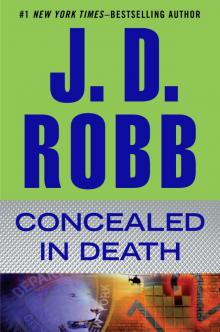 Concealed in Death
Concealed in Death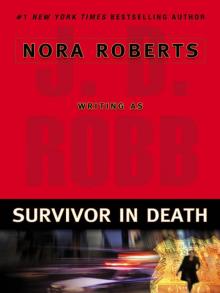 Survivor in Death
Survivor in Death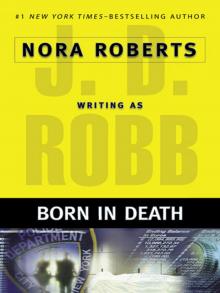 Born in Death
Born in Death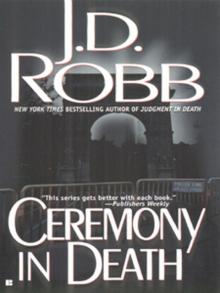 Ceremony in Death
Ceremony in Death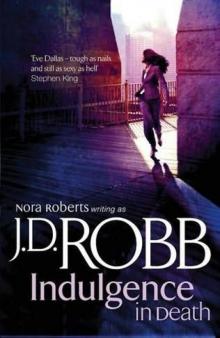 Indulgence in Death
Indulgence in Death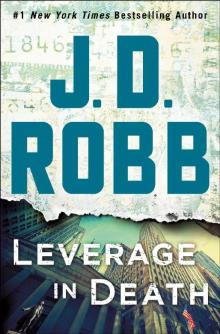 Leverage in Death
Leverage in Death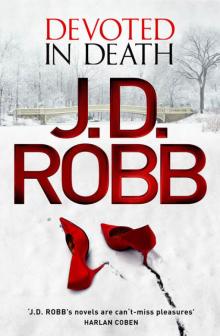 Devoted in Death
Devoted in Death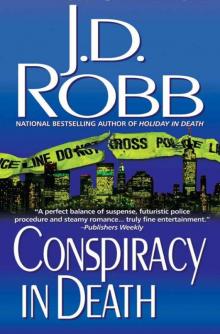 Conspiracy in Death
Conspiracy in Death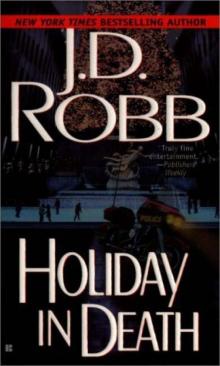 Holiday in Death
Holiday in Death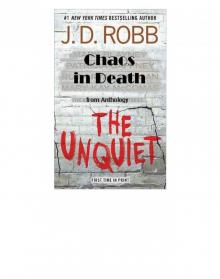 The Unquiet
The Unquiet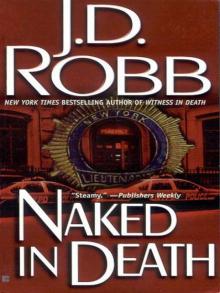 Naked in Death
Naked in Death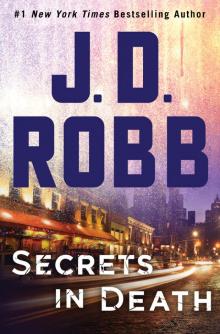 Secrets in Death
Secrets in Death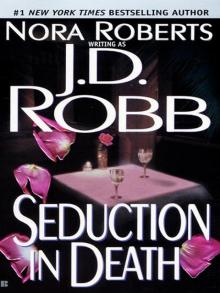 Seduction in Death
Seduction in Death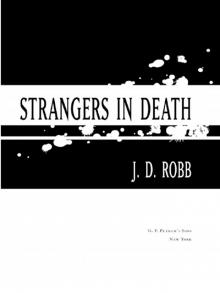 Strangers in Death
Strangers in Death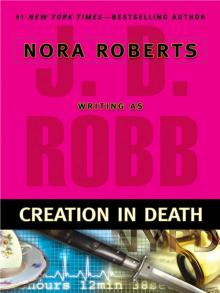 Creation in Death
Creation in Death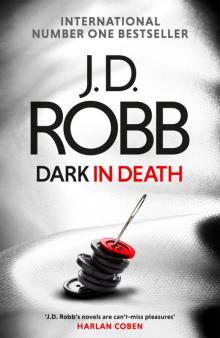 Dark in Death
Dark in Death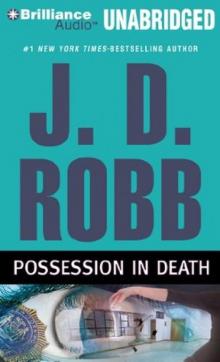 Possession in Death
Possession in Death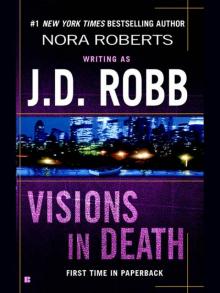 Visions in Death
Visions in Death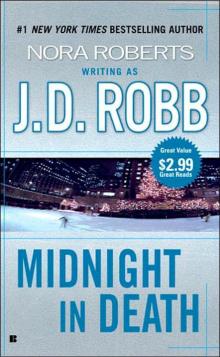 Midnight in Death
Midnight in Death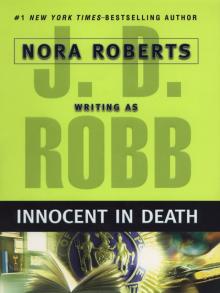 Innocent in Death
Innocent in Death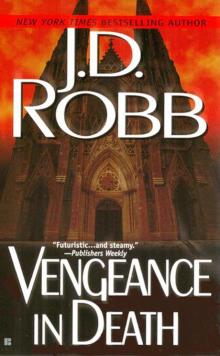 Vengeance in Death
Vengeance in Death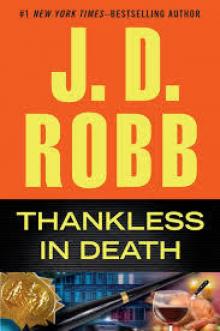 Thankless in Death
Thankless in Death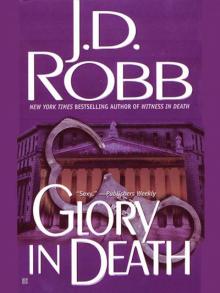 Glory in Death
Glory in Death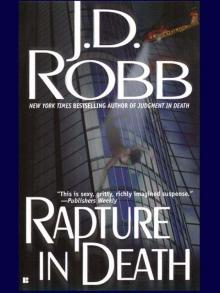 Rapture in Death
Rapture in Death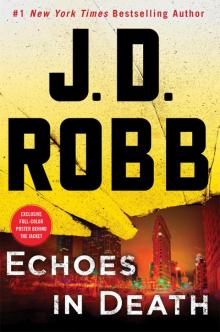 Echoes in Death
Echoes in Death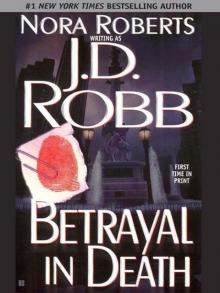 Betrayal in Death
Betrayal in Death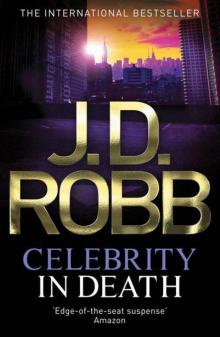 Celebrity in Death
Celebrity in Death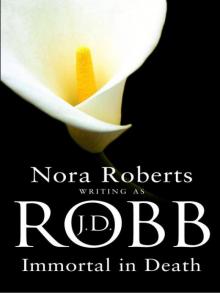 Immortal in Death
Immortal in Death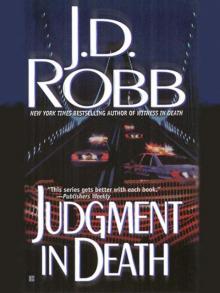 Judgment in Death
Judgment in Death Ritual in Death
Ritual in Death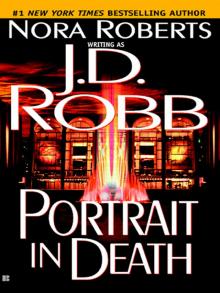 Portrait in Death
Portrait in Death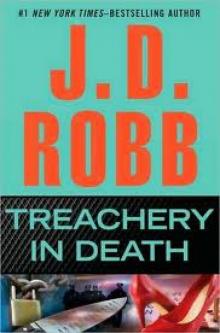 Treachery in Death
Treachery in Death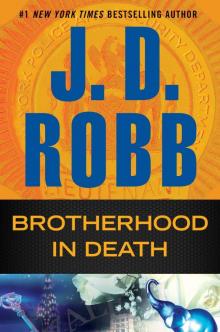 Brotherhood in Death
Brotherhood in Death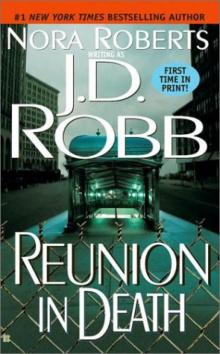 Reunion in Death
Reunion in Death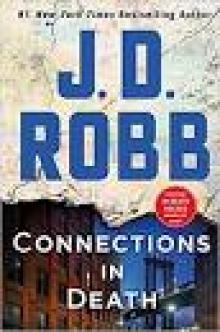 Connections in Death: An Eve Dallas Novel
Connections in Death: An Eve Dallas Novel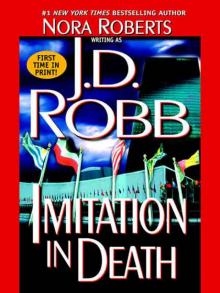 Imitation in Death
Imitation in Death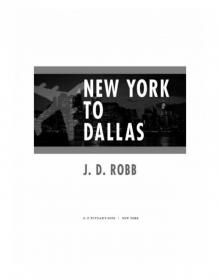 New York to Dallas
New York to Dallas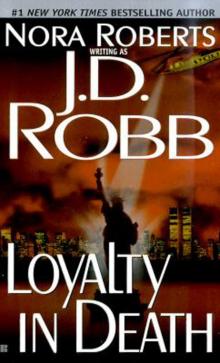 Loyalty in Death
Loyalty in Death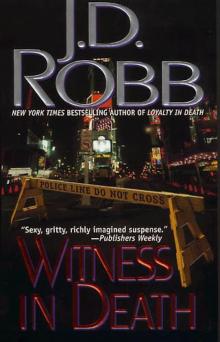 Witness in Death
Witness in Death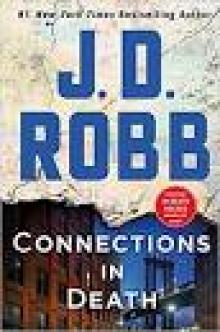 Connections in Death
Connections in Death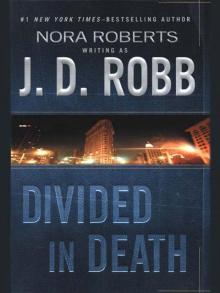 Divided in Death
Divided in Death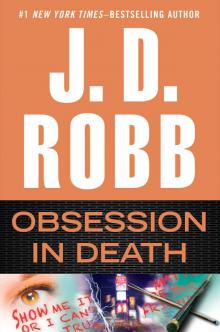 Obsession in Death
Obsession in Death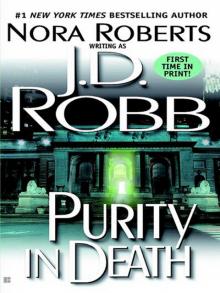 Purity in Death
Purity in Death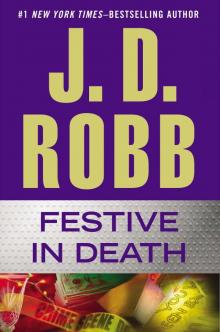 Festive in Death
Festive in Death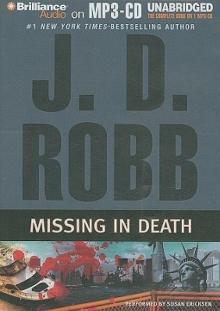 Missing in Death
Missing in Death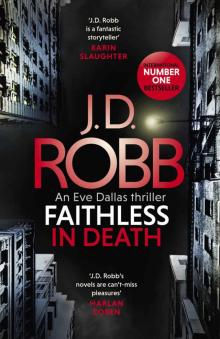 Faithless in Death: An Eve Dallas Thriller (Book 52)
Faithless in Death: An Eve Dallas Thriller (Book 52)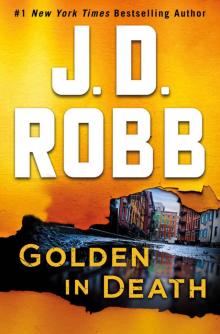 Golden in Death
Golden in Death The In Death Christmas Collection
The In Death Christmas Collection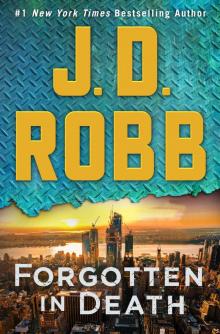 Forgotten in Death
Forgotten in Death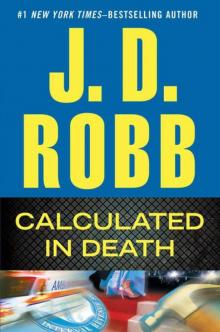 Calculated in Death
Calculated in Death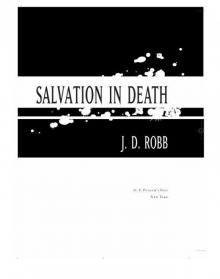 Salvation in Death
Salvation in Death Interlude in Death
Interlude in Death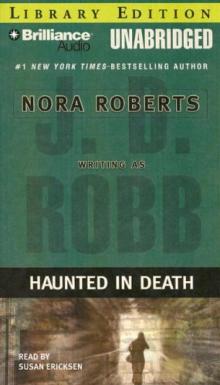 Haunted in Death
Haunted in Death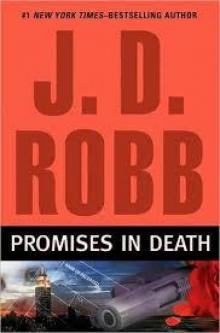 Promises in Death
Promises in Death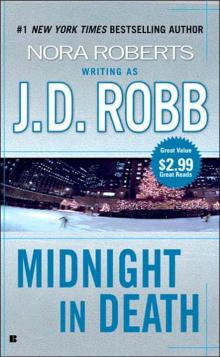 In Death 07.5 - Midnight in Death
In Death 07.5 - Midnight in Death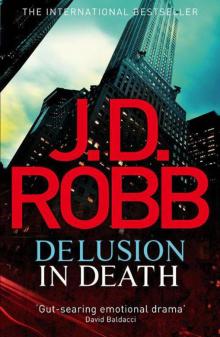 44 Delusion in Death
44 Delusion in Death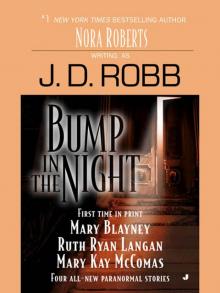 Bump in the Night
Bump in the Night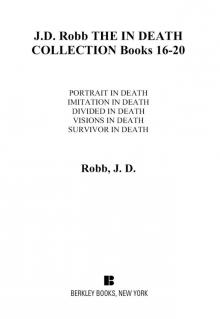 The In Death Collection, Books 16-20
The In Death Collection, Books 16-20![[In Death 17] - Imitation in Death Read online](http://i1.bookreadfree.com/i/03/20/in_death_17_-_imitation_in_death_preview.jpg) [In Death 17] - Imitation in Death
[In Death 17] - Imitation in Death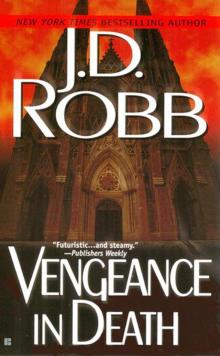 In Death 06 - Vengeance in Death
In Death 06 - Vengeance in Death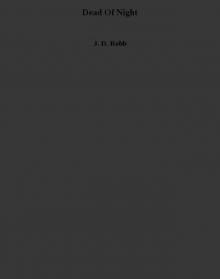 Dead Of Night
Dead Of Night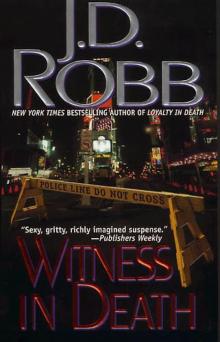 In Death 10 - Witness in Death
In Death 10 - Witness in Death![[In Death 16] - Portrait in Death Read online](http://i1.bookreadfree.com/i1/03/27/in_death_16_-_portrait_in_death_preview.jpg) [In Death 16] - Portrait in Death
[In Death 16] - Portrait in Death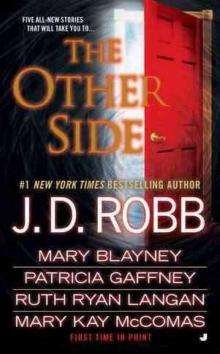 Possession in Death edahr-39
Possession in Death edahr-39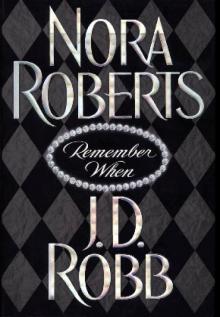 Remember When edahr-20
Remember When edahr-20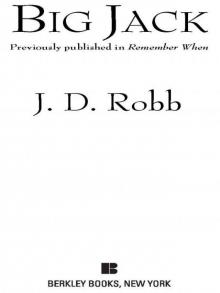 Big Jack
Big Jack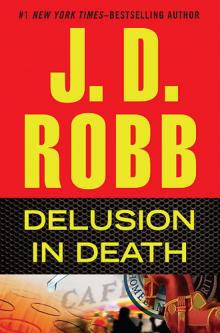 Delusion in Death edahr-44
Delusion in Death edahr-44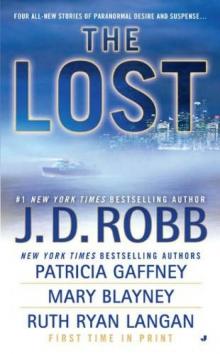 Missing in Death edahr-36
Missing in Death edahr-36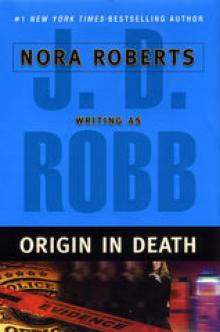 Origin in Death edahr-24
Origin in Death edahr-24![[In Death 18] - Divided in Death Read online](http://i1.bookreadfree.com/i1/04/03/in_death_18_-_divided_in_death_preview.jpg) [In Death 18] - Divided in Death
[In Death 18] - Divided in Death The Lost
The Lost![[In Death 05] - Ceremony in Death Read online](http://i1.bookreadfree.com/i1/04/01/in_death_05_-_ceremony_in_death_preview.jpg) [In Death 05] - Ceremony in Death
[In Death 05] - Ceremony in Death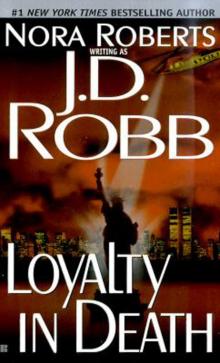 In Death 09 - Loyalty in Death
In Death 09 - Loyalty in Death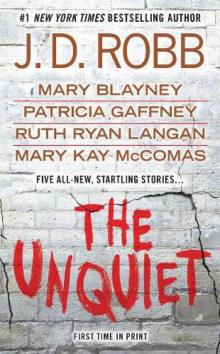 Chaos in Death edahr-42
Chaos in Death edahr-42 In Death 12.5 - Interlude in Death
In Death 12.5 - Interlude in Death![In Death [47] Leverage in Death Read online](http://i1.bookreadfree.com/i1/04/01/in_death_47_leverage_in_death_preview.jpg) In Death [47] Leverage in Death
In Death [47] Leverage in Death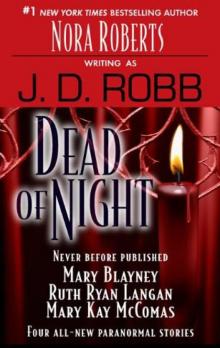 In Death - 24.50 - Dead of Night
In Death - 24.50 - Dead of Night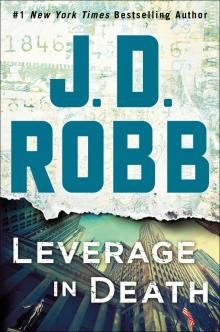 Leverage in Death--An Eve Dallas Novel
Leverage in Death--An Eve Dallas Novel![[In Death 24] - Innocent in Death Read online](http://i1.bookreadfree.com/i1/04/05/in_death_24_-_innocent_in_death_preview.jpg) [In Death 24] - Innocent in Death
[In Death 24] - Innocent in Death![[In Death 15] - Purity in Death Read online](http://i1.bookreadfree.com/i1/04/05/in_death_15_-_purity_in_death_preview.jpg) [In Death 15] - Purity in Death
[In Death 15] - Purity in Death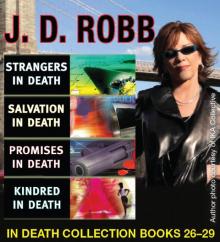 The In Death Collection, Books 26-29
The In Death Collection, Books 26-29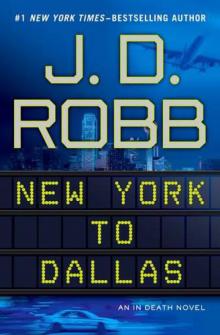 New York to Dallas edahr-41
New York to Dallas edahr-41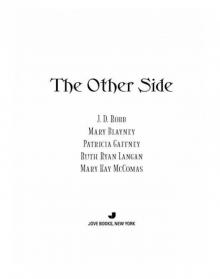 The Other Side
The Other Side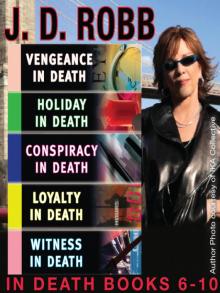 The In Death Collection 06-10
The In Death Collection 06-10![[In Death 08] - Conspiracy in Death Read online](http://i1.bookreadfree.com/i2/04/05/in_death_08_-_conspiracy_in_death_preview.jpg) [In Death 08] - Conspiracy in Death
[In Death 08] - Conspiracy in Death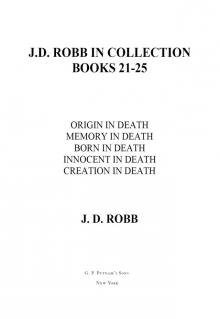 The In Death Collection, Books 21-25
The In Death Collection, Books 21-25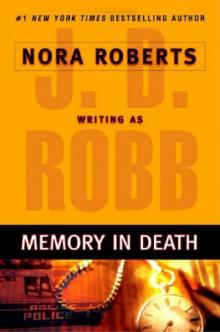 Memory in Death edahr-25
Memory in Death edahr-25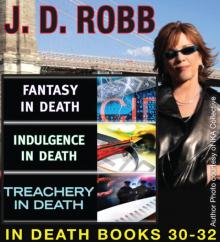 The In Death Collection, Books 30-32
The In Death Collection, Books 30-32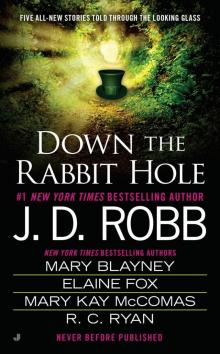 Down the Rabbit Hole
Down the Rabbit Hole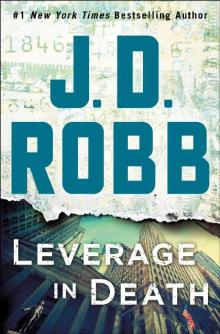 Leverage in Death: An Eve Dallas Novel (In Death, Book 47)
Leverage in Death: An Eve Dallas Novel (In Death, Book 47)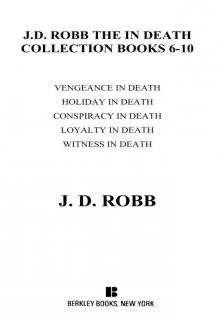 The In Death Collection, Books 6-10
The In Death Collection, Books 6-10 The In Death Collection, Books 11-15
The In Death Collection, Books 11-15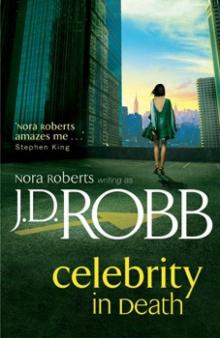 Celebrity in Death edahr-43
Celebrity in Death edahr-43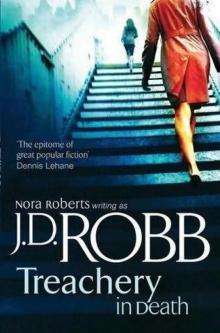 Treachery in Death edahr-40
Treachery in Death edahr-40![[In Death 12] - Betrayal in Death Read online](http://i1.bookreadfree.com/i2/04/13/in_death_12_-_betrayal_in_death_preview.jpg) [In Death 12] - Betrayal in Death
[In Death 12] - Betrayal in Death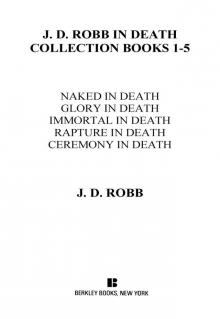 The In Death Collection, Books 1-5
The In Death Collection, Books 1-5